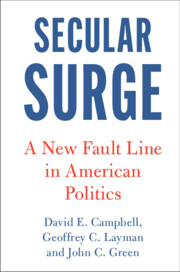Book contents
- Secular Surge
- Cambridge Studies in Social Theory, Religion, and Politics
- Secular Surge
- Copyright page
- Dedication
- Contents
- Figures
- Tables
- A Closer Look
- Preface
- Acknowledgments
- 1 The Secular Surge
- 2 America the Secular
- 3 Public Secularism
- 4 Secularism and Civic Engagement
- 5 Secularism and Political Attitudes
- 6 Nonreligiosity and Backlash Politics
- 7 Secularism and Party Politics
- 8 Secularism and the Democrats
- 9 Nonreligiosity and the Republicans
- 10 Secularism on the Stump
- 11 Beyond the Secular Surge
- Bibliography
- Index
10 - Secularism on the Stump
Published online by Cambridge University Press: 14 January 2021
- Secular Surge
- Cambridge Studies in Social Theory, Religion, and Politics
- Secular Surge
- Copyright page
- Dedication
- Contents
- Figures
- Tables
- A Closer Look
- Preface
- Acknowledgments
- 1 The Secular Surge
- 2 America the Secular
- 3 Public Secularism
- 4 Secularism and Civic Engagement
- 5 Secularism and Political Attitudes
- 6 Nonreligiosity and Backlash Politics
- 7 Secularism and Party Politics
- 8 Secularism and the Democrats
- 9 Nonreligiosity and the Republicans
- 10 Secularism on the Stump
- 11 Beyond the Secular Surge
- Bibliography
- Index
Summary
Uses a set of experiments to explore how voters react to political candidates who describe themselves with varying degrees of secularity, from a hard-edged version such as “atheist” to a softer statement like “I’m not particularly religious.” The results show that while voters are averse to candidates who express disbelief in God, they are open to candidates who describe their secularity in other ways.
- Type
- Chapter
- Information
- Secular SurgeA New Fault Line in American Politics, pp. 181 - 208Publisher: Cambridge University PressPrint publication year: 2020

